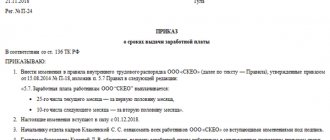Checking local regulations
All employers are required to issue advance payments and salaries starting October 3 in accordance with the new rules.
The deadline for payment of wages is set on the 15th of the next month. The advance must be paid no later than 15 days after the salary for the previous month. This means that if wages are paid to an employee on the 5th, the advance cannot be paid later than the 20th. If the advance was made on the 25th, then the deadline for salary is no later than the 10th. The Labor Code allows for the establishment of individual salary and advance payment days for different employees of the organization. However, it must be no later than the 15th day of the first half of the month. For violation of payment terms, the employer faces a fine of 50 thousand rubles, by virtue of Article 5.27 of the Code of Administrative Offenses of the Russian Federation.
Specific terms for payment of wages at many enterprises are reflected in the Labor Regulations and in the Regulations on Remuneration. The law on salary payment deadlines in 2020 does not prohibit this. However, by the time the law comes into force, the payment terms must be brought into compliance with the requirements of this law.
In turn, the employer must familiarize employees with the changes made to local regulations against signature.
The situation is similar with labor and collective agreements. They should reflect the timing of salary payments in 2020. It is possible that their content already fully complies with the requirements of the new law. But it is possible that the contract allows for payment of wages later than the 15th of the next month, for example, the 20th. It may also turn out that the gap between the payment of the advance and the payment of wages is more than 15 days.
According to the changes in legislation being considered, these are violations.
To make appropriate changes to the employment contract, it is necessary to send the employee a written notice of changes to the terms of the employment contract. The notice must list the changes to the contract, indicating specific reasons and grounds. In this case, the notification must contain new deadlines for payment of wages according to the Labor Code of the Russian Federation.
Moreover, in accordance with Part 2 of Art. 74 of the Labor Code of the Russian Federation, notification must be sent to the employee no later than two months before the changes are made.
In addition to editing the contract itself, it is necessary to conclude an additional document. agreement, which will also fix new terms for payment of wages.
Making changes to the contract and concluding a new additional agreement to it is enough to change the terms of payment of wages. There is no need to issue an order to postpone the payment of wages.
The company has the right to issue salaries to different employees with a difference of 10 days. For example, if a company wants to set different deadlines for paying wages in departments: in one - on the 20th and 5th, in another - on the 30th and 15th.
The Labor Code does not prohibit the payment of salaries on different days. The main thing is to comply with the requirements of Article 136 of the Labor Code of the Russian Federation - issue no later than the 15th day and at intervals of at least half a month (letter of Rostrud dated June 20, 2014 No. PG/6310-6-1). Even if workers receive money within 10 days of each other, such conditions are not considered discrimination.
The dates of the 30th and 15th are not very good. If there are 30 days in a month, then the company will have to issue salaries on the last day of the month. This means that personal income tax will need to be withheld not only from the second part of the salary, but also from the first (letter of the Federal Tax Service of Russia dated 03.24.16 No. BS-4-11/4999, determination of the RF Armed Forces dated 05.11.16 No. 309-KG16-1804).
Changes in the Law
The employer is obliged to fix a specific schedule for the transfer of salary money in its local regulations (LNA): internal labor regulations (ILR), collective or labor agreement. It is these 3 documents that Art. 136 Labor Code of the Russian Federation.
The wording of this article is designed in such a way that the question often arises: is it necessary to fix salary terms in all of the above documents or is one of them sufficient? The answer to it was repeatedly given by both officials and judges (letter of Rostrud dated March 6, 2012 No. PG/1004-6-1, ruling of the Moscow City Court dated December 24, 2012 No. 4g/5-12211/12).
For information on what to include in an employment contract, read the article “Procedure for concluding an employment contract (nuances).”
According to the explanations, it is enough that the deadlines are fixed in one of those given in Art. 136 Labor Code of the Russian Federation documents. Moreover, according to Rostrud, PVTR is a priority. He explains this by saying that the PVTR is a general document, the norms of which apply to all personnel, while an employment contract regulates relations with a specific employee, and a collective agreement may not be concluded at all.
In order to completely eliminate disputes with inspectors, you can do the following: fix the rules for issuing wages in the PVTR, and add a phrase in labor or collective agreements that refers to the PVTR: “salaries are issued in accordance with clause (here we indicate the clause number of the PVTR) of the rules labor regulations..."
If for some reason you do not have LNA regulating the timing of salary transfers, they need to be done as quickly as possible. If the necessary LNAs exist, but the dates in them are indicated incorrectly, this should be promptly corrected:
- If possible, redo the document, but only if doing so will not cause inconsistencies with your other documentation.
- In order to change the collective agreement, assemble a commission of representatives of both parties - employees and employer. Document the results of the negotiations between the commission members in an additional agreement, in which you indicate the new salary terms.
- If salary dates were included in employment contracts, you will have to draw up additional agreements for each of them.
- Changes in the terms of payment of wages included in the PVTR are the easiest to formalize - to do this, it is enough to issue an order, which should be familiarized to each employee against signature.
The terms for payment of advance payments and salaries in 2020 have undergone changes. In accordance with the innovations, payment must be made no later than the 15th day of the month following the reporting period.
The law provides for changes to Article 136 of the Labor Code of the Russian Federation. It reflects the new deadlines for transferring salaries to employees. Specific dates are not specified in it. The law provides for payments at least for each half of the month worked.
The new version of the article will be valid on October 3, 2020. In addition to the fact that payment will be made every half month, legislators have added to the norms an indication that funds will be transferred no later than the 15th of the next month.
Specific deadlines are prescribed in local documents in force in the institution.
These include:
- inner order rules;
- collective agreement;
- contract of employment.
The salary must be divided into two parts for each half of the month worked. Those employers who have not previously used such a system must make the transition to it. In order to comply with labor laws, it is important to prepare certain documents. The basis for payment of the advance is an application submitted by an employee of the organization.
When compiling it, you need to focus on some important rules:
- The document can be drawn up by hand or printed on a computer. It must be prepared on a white A4 sheet.
- The application header is located in the upper right corner. It contains the addressee's details. This is the employer. In relation to it, the name of the organization, position, surname, first name, patronymic of the head, and legal address are indicated. The details of the applicant are also recorded. He indicates his full name and residential address.
- The word “Statement” is written in the central part of the document.
- Next comes the main part of the document. It can be compiled arbitrarily. It is important to note what the applicant is asking for, as well as in what amount.
- It is necessary to note the reasons for drawing up the application. They help the manager make decisions.
- At the end of the document the signature of the originator and the date of preparation of the application are placed.
When the employer reviews the appeal, he makes a decision. If the request is supported, an order is issued to pay an advance from the salary.
In order for your salary terms to comply with legal requirements, you also need to remember that salaries must be paid at least every half month (Article 136 of the Labor Code of the Russian Federation). Therefore, taking into account this rule, wages must be paid:
- for the first half of the month (advance) - no later than the 30th of the current month (for February - no later than the 28th or 29th (Rostrud Information);
- for the second half of the month - no later than the 15th day of the next month.
For example, wages for the first half of November 2020 must be paid no later than November 30, 2018, and employees must receive wages for the second half of November no later than December 14, 2018. Since December 15 is a Saturday, accordingly, wages must be paid on the last working day before this weekend (Article 136 of the Labor Code of the Russian Federation).
Employers whose payment terms do not meet the requirements of the Labor Code of the Russian Federation need to make changes to their internal documents. And the execution of changes will depend on which document records the salary terms.
Changes in the terms of payment of wages reflected in the internal labor regulations are formalized by order. Moreover, if there is a trade union, it is necessary to take into account its opinion regarding changes in the terms of payment of wages.
A sample order to change the timing of salary payments can be found here.
Having made changes to the PVTR, do not forget to familiarize each employee with these changes against signature.
Keep in mind that if an employee refuses to sign an additional agreement to the employment contract, the employer may recognize the change in salary terms as a change in organizational working conditions. In this case, the employer needs to notify each employee in writing about the upcoming change in the timing of salary payment. The employer must do this no later than 2 months before making changes.
If the employee does not agree with the innovations, then theoretically such an employee can be dismissed with payment of severance pay in the amount of two weeks’ average earnings (Article 74, paragraph 7, part 1, Article 77, Article 178 of the Labor Code of the Russian Federation).
When should wages be paid for the first half of the month?
First, let us recall the provisions of Part 6 of Art. 136 of the Labor Code of the Russian Federation, according to which wages are paid at least every half month. The specific date for payment of wages is established by internal labor regulations, a collective agreement or an employment contract no later than 15 calendar days from the end of the period for which it was accrued. Please note that in this edition, this part has been in effect since October 3, 2020 (clause 1, article 2, article 4 of the Federal Law of July 3, 2016 No. 272-FZ).
The seemingly insignificant changes required many employers to make amendments to local regulations and employment contracts.
In Letter No. 14-1/OOG-8532 dated September 23, 2016, the Ministry of Labor noted that the documents that can establish wage payment days in Art. 136 of the Labor Code of the Russian Federation are listed separated by commas, that is, the legislator emphasizes the equivalence of these documents, in any of which the issue of days of payment of wages can be resolved.
The Information of Rostrud “On the application of Article 2 of the Federal Law of July 3, 2020 No. 272-FZ “On amendments to certain legislative acts of the Russian Federation in terms of remuneration” (posted on the official website of the department on December 20, 2016) states that This law does not change the procedure for paying wages.
At the same time, taking into account the new wording of Art. 136 of the Labor Code of the Russian Federation, wages must be paid:
- for the first half of the month - on the established day from the 16th to the 30th (31st) day of the current period;
- for the second half of the month – from the 1st to the 15th of the next month.
As for setting the date for payment of the advance, according to the explanations of the Ministry of Labor given in Letter No. 14-1/10/B-660 dated 02/03/2016 “On the amount and timing of payment of wages, including for half a month”, the Labor Code establishes a requirement for the maximum the permissible period of time between payments of parts of wages with regulation regarding the issue of specific terms for its payment at the employer level.
At the same time, it is unacceptable to establish, instead of a specific day of salary payment, a period during which it can be paid (for example, from the 16th to the 18th). This conclusion is contained in the Letter of the Ministry of Labor of the Russian Federation dated November 28, 2013 No. 14-2-242.
Recently, both the Ministry of Finance and the Federal Tax Service have received many clarifications, according to which there is no need to withhold personal income tax from the advance payment (letters of the Federal Tax Service of the Russian Federation dated 04.29.2016 No. BS-4-11/7893, dated 03.24.2016 No. BS-4-11 /4999, Ministry of Finance of the Russian Federation dated October 27, 2015 No. 03-04-07/61550).
Let us recall that by virtue of clause 3 of Art. 226 of the Tax Code of the Russian Federation, tax amounts are calculated by tax agents on the date of actual receipt of income, determined in accordance with Art. 223 of the Tax Code of the Russian Federation, on a cumulative basis from the beginning of the tax period in relation to all income (except for income from equity participation in the activities of the organization), in respect of which the tax rate established by paragraph 1 of Art. 224 of the Tax Code of the Russian Federation, accrued to the taxpayer for a given period, with the offset of the amount of tax withheld in previous months of the current tax period.
The Letter of the Ministry of Finance of the Russian Federation dated 01.02.2016 No. 03-04-06/4321 noted that before the end of the month, income in the form of wages cannot be considered received by the taxpayer. Accordingly, the tax cannot be calculated until the end of the month. Consequently, the tax agent deducts the amount of tax calculated at the end of the month from the taxpayer only when it is actually paid after the end of the month for which this amount of tax was calculated. A similar opinion is contained in the Ruling of the Supreme Court of the Russian Federation dated May 11, 2016 No. 309-KG16-1804.
At the same time, you need to pay attention to the situation when the advance is paid on the last day of the month.
The Ministry of Finance believes (see Letter No. 03-04-06/69181 dated November 23, 2016) that if the tax agent manages to pay the advance before the end of the month, then personal income tax does not need to be transferred to the budget. This is due to the fact that, as a general rule, the institution calculates personal income tax on the last day of the month, and the tax must be withheld once - when paying income after the end of the month.
As for the arbitrators, they are also of the opinion that when paying an advance on the last day of the month, personal income tax on its amount does not need to be transferred to the budget (Resolution of the AS UO of February 24, 2016 No. F09-11987/15 in case No. A76-10562/2015).
If the salary payment day falls on a weekend
In accordance with the Labor Code of the Russian Federation, salaries must be calculated at least every 15 days on the day specified in the company’s labor regulations and in the contract.
As a result, the day of accrual of the advance (for the first 15 days of the month) and the date of calculation must be specified in the agreement between the director of the company and the worker.
If this day is Saturday, Sunday or the day of any holiday in the Russian Federation, the salary payment must be made before this day (Part 8 of Article 136 of the Labor Code of the Russian Federation).
So, the day of payment for salary in a company is the 5th day of the month following the reporting month. In such a situation, the salary for August 2020 should be issued to the employee on Friday, August 3, 2020. After all, August 5, 2019 is Sunday, and August 4, 2020 is Saturday.
Fines for violating wage payment deadlines in 2020
By October 3, it is necessary to bring the terms of employment contracts into compliance with the new requirements of labor legislation. If the salary day is incorrectly stated in them - it is set later than the 15th, or the interval between the advance and salary is more than 15 days, changes must be made. To do this, you do not need to enter into a new employment contract.
Innovations are now accompanied by higher fines. From October 3, 2020, fines for a primary violation are (clause 1 of Article 5.27 of the Code of Administrative Offenses of the Russian Federation):
- from 1000 to 5000 rub. (IP);
- from 30,000 to 50,000 rub. (organizations);
- The fine for the manager will be from 10,000 to 20,000 rubles;
- For repeated violation: from 50,000 to 100,000 rubles.
The employer will also have to pay compensation for delayed wages. The compensation will double and will be calculated from 1/150 of the key rate of the Central Bank of the Russian Federation for each day of delay (Article 236 of the Labor Code of the Russian Federation).
We advise employers to check the completed employment contracts of employees, and if the dates for payment of wages are indicated there, they must be adjusted to take into account new changes.
Firm maker, September 2016Anastasia Chizhova (Konatova)When using the material, a link is required
It is worth noting that the norm of Part 6 of Art. 136 of the Labor Code of the Russian Federation is imperative in nature, therefore, its application does not depend on the will of employees. The fact is that in practice there are still situations where employers pay wages once a month based on the relevant statements of employees. For such amateur performances in accordance with Part 6 of Art. 5.27 of the Administrative Code of the Russian Federation they face a fine:
- for officials (manager and accountant) - in the amount of 10,000 to 20,000 rubles;
- for legal entities - in the amount of 30,000 to 50,000 rubles.
Repeated violation entails the imposition of an administrative fine in a larger amount (for officials - from 20,000 to 30,000 rubles, for legal entities - from 50,000 to 100,000 rubles). This is provided for in Part 7 of Art. 5.27 Code of Administrative Offenses of the Russian Federation. Instead of a fine, another measure of liability is possible - disqualification of an official for a period of one to three years.
Please note that the arbitrators side with labor inspectors when imposing fines (resolutions of Judicial District No. 33 of the Orichevsky Judicial District of the Kirov Region dated 02.02.2017 No. 5-78/2017, Judicial District No. 1 of the Nizhny Novgorod District of Nizhny Novgorod, Nizhny Novgorod Region from 31.01.
In practice, another situation is possible - when the advance payment is provided for by local regulations, but is made with a delay.
In this case, the employer faces financial liability in accordance with Art. 236 of the Labor Code of the Russian Federation (as amended by Federal Law No. 272-FZ). Unlike an administrative fine, payments are made in favor of employees whose rights have been violated.
If the payment deadlines are violated, the employer must pay the employee compensation for each day of delay. The amount of such compensation is not less than 1/150 of the key rate of the Central Bank of the Russian Federation in force at that time of the amounts not paid on time for each day of delay, starting from the next day after the established payment deadline up to and including the day of actual settlement. The amount of monetary compensation is calculated from the amounts actually not paid on time.
According to current legislation, failure to pay wages on time entails financial liability for the employer. The corresponding provision is contained in Art. 236 Labor Code of the Russian Federation. In accordance with the new law, financial liability will be increased.
Let us remind you that the amount of compensation for delayed wages is calculated as a percentage of the amounts not paid to the employee on time. From October 3, 2020, the amount of compensation was increased.
Until October 3, 2016, compensation was 1/300 of the Bank of Russia refinancing rate for each day of delay. From October 3, 2016, it is 1/150 of the Bank of Russia refinancing rate for each day of delay. In 2020, the refinancing rate is 7.75%.
| Responsible person | Fines until 03.10.2016 | Fines in effect in 2020 |
| Head of the enterprise | 1000–5000 rub. or warning | 10,000–20,000 rub. or warning |
| IP | 1000–5000 rub. | 1000–5000 rub. |
| Entity | 30,000–50,000 rub. | 30,000–50,000 rub. |
| Repeated delay in payment | ||
| Head of the enterprise | 10,000–20,000 rub. or disqualification for 1-3 years | 20,000–30,000 rub. or disqualification for 1-3 years |
| IP | 10,000–20,000 rub. | 10,000–30,000 rub. |
| Entity | 50,000–70,000 rub. | 50,000–100,000 rub. |
It is also necessary to remember that the employer may be held administratively liable if the wages of employees are set at a level below the minimum wage. Let us remind you that in 2020 the minimum wage, in accordance with federal legislation, is 11,280 rubles. However, the size of the minimum wage in individual regions may differ from this figure.
Please also note that in addition to fines for paying wages late, the employer may be additionally fined if the wage is below the minimum wage. The fine for the organization will be from 30,000 to 50,000 rubles. Let us remind you that from July 1, 2020, the federal minimum wage is 11,280 rubles. However, if a regional minimum wage is established, then employers have the right to rely on it.
If the deadlines for paying salaries in 2020 are violated, the employer is obliged to pay compensation to employees (Article 236 of the Labor Code of the Russian Federation). Compensation is also paid in cases of delay in other payments: vacation pay, benefits, etc. Compensation should be calculated based on 1/150 of the Central Bank key rate for each day of delay for each payment. The Central Bank key rate is 7.75% (decision of the Bank of Russia dated December 17, 2018).
The amount of compensation may be higher than recommended. Fix the amount of financial responsibility in a collective agreement, employment contract or local regulation.
In addition, there are two types of fines:
- For violation of the deadline for payment of wages;
- For setting wages below the regional or federal minimum wage 2020 (Parts 6, 7, Article 5.27 of the Code of Administrative Offenses of the Russian Federation).
See the table below for the fine amounts.
| Type of violation | Amount of fine | ||
| Per company | For the director | ||
| 1 | Violation of labor legislation, regulations | From 30 to 50 thousand rubles | Warning or fine from 1 to 5 thousand rubles |
| Repeated violation | From 50 to 70 thousand rubles | From 10 to 20 thousand rubles or disqualification for 1-3 years | |
| 2 | Evasion of drawing up an employment contract | From 50 to 100 thousand rubles | From 10 to 20 thousand rubles |
| Repeated violation | From 100 to 200 thousand rubles | disqualification for 1-3 years | |
| 3 | Non-payment, incomplete payment of wages on time | From 30 to 50 thousand rubles | From 10 to 20 thousand rubles or a warning |
| Repeated violation | From 50 to 100 thousand rubles | From 10 to 20 thousand rubles or disqualification for 1-3 years | |
It is legally determined that the employer must make wage payments twice a month. The deadline for the last payment is also set. It should not be issued later than the 15th day following the reporting month. Some employers ignore the law.
They can:
- pay wages once a month;
- take longer breaks between payments than required by law;
- pay the main part of the salary later than the 15th day of the next month.
All of these actions may be considered violations of the law. If they are identified, then labor legislation provides for administrative liability. It is expressed in the form of a fine. Its size is determined by Article 5.27 of the Code of Administrative Offenses of the Russian Federation.
Officials will have to pay no less than 10 and no more than 20 thousand rubles. If the delay in payment is carried out by a legal entity, then the sanctions are tougher. The amount increases to 30–50 thousand rubles.
Special punishments are provided for persons who commit such offenses not for the first time. Officials will pay a fine of 20 to 30 thousand rubles. However, they may be disqualified for one or three years. Legal entities will be fined from fifty to one hundred thousand rubles. These norms are reflected in paragraph seven of Article 5.27 of the code.
There are also other penalties that are applied in case of violation of the terms of transfer of advance payments. They are prescribed in paragraphs 1 and 2 of Article 5.27 of the code.
If the violation is primary, then officials will need to pay a fine of one to five thousand rubles. If the offense is repeated, the sanctions increase to 10–20 thousand rubles and disqualification for a year or three years.
What are the new salary payment rules from July 1, 2020?
Changes in wages from July 1, 2020 are that now employers specified in Law No. 88-FZ are required to transfer wages to their employees to the bank card of the MIR state payment system.
Thus, the employer had to take care before the specified deadline to conclude an agreement on a salary project with a credit institution and issue cards of the MIR state payment system for its employees.
According to paragraph 4 of Art. 136 of the Labor Code of the Russian Federation, an employee can independently choose a credit institution where his salary will be transferred. At the same time, he is obliged to provide the employer with an application for choosing a bank with attached account details for transferring funds.
According to the rules for paying wages from July 1, 2020, the card provided by the employee must only be a card of the MIR state payment system. The employer will not be able to transfer wages to another card, even if there is an application from the employee. Thus, the employee should have received the said card in advance.
It should be noted that all other payments in favor of the employee from the employer, for example, accountable funds or funds for travel expenses, also need to be transferred only to MIR cards.
On payment of an advance in a fixed amount.
The issue of calculating a fixed amount for paying wages by the advance method to an employee of a public sector organization was considered by the Ministry of Finance in Letter No. 02-07-05/17670 dated March 29, 2016. Department officials indicated that such an issue is within the competence of the Ministry of Labor, and not the Ministry of Finance. At the same time, financiers recalled that, according to Art.
91 of the Labor Code of the Russian Federation, wages are calculated for the actual time worked, determined within the framework of accounting organized by the employer. At the same time, the procedure for paying wages (terms, amount and components), established by local acts of the institution, should not contradict the provisions of the Labor Code of the Russian Federation.
As for the accounting of actually worked time, Order of the Ministry of Finance of the Russian Federation No. 52n[2] approved the form of a sheet of accounting for the use of working time, on the basis of which a fixed amount is calculated for actually worked time for the first half of the month (including adjustment of the fixed amount), and methodological recommendations for it formation.
Taking into account these clarifications from the Ministry of Finance, the above position of the Ministry of Labor, as well as the risks associated with paying an advance in a fixed amount, we consider this method of paying salaries for the first half of the month unacceptable for public sector institutions.
What are non-working days?
In connection with the spread of coronavirus, the President declared non-working days from March 30 to the end of April 2020, as well as the period between the May holidays - from May 6 to May 8, 2020 inclusive. According to presidential decrees, workers retain their wages on these days. All employers without exception are required to pay it.
Presidential Decrees:
dated March 25, 2020 No. 206,
dated 04/02/2020 No. 239,
dated 04/28/2020 No. 294








